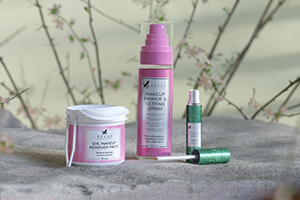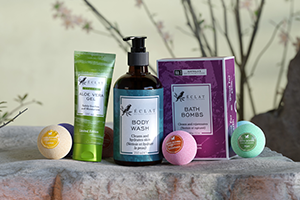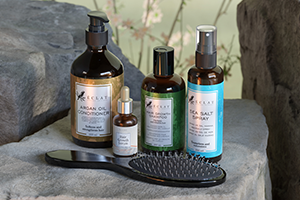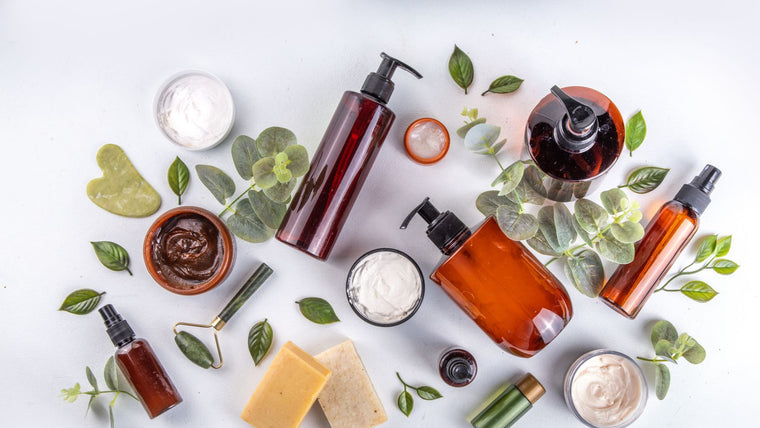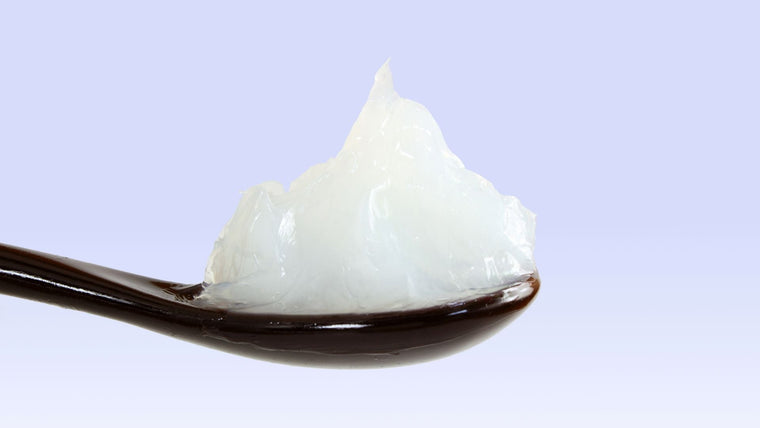Confused About Vitamin C? Here's the Info You Need to Know
- 09/06/2023

Of all the antioxidants out there, vitamin C is one of the greatest wonder-workers for your health. It's able to make a difference not just to your skin, but to your whole body.
This potent antioxidant comes in many iterations so, to cut through the clutter, we're also going to get into different forms of vitamin C, and unpack the difference between vitamin C vs ascorbic acid.
Here at Éclat, we're primarily focused on skin health but, because that's also connected to your overall wellbeing, in this article we're also going to touch on some general benefits of vitamin C, including how you can enjoy it in the form of yummy things like citrus fruits, vegetables, and orange juice. Let's go!
What is vitamin C?
Vitamin C is a water-soluble vitamin. This means that, unlike fat-soluble vitamins, it doesn't stick around in your body for the long term. Instead of being stored, water-soluble vitamin C enters the body through your bloodstream, and any excess is flushed out in your urine.
That's why it's important that we keep up our intake of doses of vitamin C, be it as a dietary supplement, as whole food (e.g. fruits and vegetables), or as healthy drinks (e.g. orange juice). The human body simply can't synthesize vitamin C on its own and, unfortunately, it doesn't have a back-up supply to rely on. If you're not careful, you'll risk winding up with a vitamin C deficiency—with its most extreme, but uncommon, form being scurvy.
Vitamin C is the primary antioxidant found in the plasma and tissues of humans. As the Linus Pauling Institute puts it, "Even in small amounts, vitamin C can protect indispensable molecules in the body," from protein to DNA. It primarily does this by shielding you from free radicals, a.k.a. nasty molecules that can cause a multitude of issues, from wrinkles to cancer.
We'll take a deeper look at vitamin C's benefits in just a sec, but let's first go over its sources and discuss how to bring this natural vitamin into your diet.
Sources of vitamin C
Fruits (particularly citrus fruits) and vegetables are the most common, powerful food sources of vitamin C. We've listed some of the most nutrient-rich ones below. How do you prefer to get yours?
- Bell peppers
- Strawberries
- Kiwifruit
- Citrus fruits (e.g. orange, lemon, and graprefruit)
- Broccoli
- Real fruit juice (e.g. orange juice and tomato juice)
- Brussels sprouts
- Tomatoes
- Potatoes
- Spinach
Health supplements offer an alternative route for those who aren't able to get enough vitamin C derived from natural dietary sources.

The current RDA (Recommended Dietary Allowance) for vitamin C in the USA is between 75 - 120mg per day, with the number varying depending on your gender, and if you're pregnant or lactating. However, it's also worth noting that the AI (Adequate Intake) is less.
Whatever amount you're aiming for, you'll hit your vitamin C intake goals with ease as long as you have a balanced diet. In fact, if healthy foods feature in your daily dietary rotation, you won't have any need for vitamin C supplements, which are best to view as helpful things to have on hand if you ever need to temporarily fill gaps in your diet.
Vitamin C benefits
There are lots of different forms of vitamin C (we'll get to that later), but they all work in similar ways to produce an impressive range of benefits for the human body. Let's investigate those further...
Vitamin C benefits for the skin
Vitamin C is the most commonly found antioxidant in skin, so it's no surprise that this natural vitamin is featured so frequently in popular beauty products. So what's the big deal?
There are three key factors why vitamin C is so good for your skin. First of all, it's able to defend it from free radicals and oxidative stress—two common culprits when it comes to aging. Vitamin C encourages more collagen and elastin production, which leads to fewer wrinkles and fine lines, as well as a general delay in signs of aging.

Secondly, vitamin C nourishes and hydrates skin, preventing the transepidermal water loss that causes dryness and dullness. Antioxidant qualities make vitamin C a great skin booster and glow-giver as well as a protector.
Finally, if you're dealing with dark spots, or discoloration, vitamin C can help out with that by fading away signs of sun damage or uneven tone.
Vitamin C benefits for the body
It's not just your skin cells that vitamin C defends. This natural nutrient is able to protect cells throughout the human body, keeping them in top condition.
Vitamin C contributes to healthy blood vessels, bones and cartilage. In humans, it's an integral part of tissue growth, development, and repair. It's also helpful in encouraging wounds to heal faster and nudging teeth to grow stronger.
We mentioned free radicals earlier. It's important to note that these molecules aren't just harmful for your face, but for your whole body. Along with toxic chemicals and pollutants, a build-up of free radicals can lead to a variety of unpleasant health conditions, including cancer, arthritis, and heart disease. Vitamin C helps to defend the body from dangerous free radicals.
Some people swear by high doses of vitamin C to ward off the common cold. Research out there suggests that while it won't stop sniffles from happening in the first place, vitamin C is a good thing to have in your diet (or to take as a supplement) if you want to reduce the severity of your symptoms or the amount of time that you're sick.
Vitamin C vs ascorbic acid: what's the difference?
Of all the vitamins and minerals out there, vitamin C might just be one of the most confusing to get your head around as it exists in a multitude of forms. From L-ascorbic acid to calcium ascorbate, the amount of varieties can be enough of an information overload to make you want to just load up on vitamin-rich foods and hope for the best. We wouldn't blame you for that!
A common query that comes up among vitamin C newbies is the benefit of vitamin C vs ascorbic acid. Is there a difference between these two, or are they actually the same thing?
Ascorbic acid is a commonly used (and, unfortunately, confusing) term to describe the purest form of vitamin C. But while ascorbic acid is always vitamin C, vitamin C is not always ascorbic acid.

Vitamin C comes in both natural and synthetic varieties. Ascorbic acid is a chemical form of vitamin C—in fact, it's the name of its chemical compound, which you'll commonly see in scientific papers and journals.
While ascorbic acid is touted as the strongest, purest form of vitamin C, it's not necessarily always the best option, especially if you're researching this nutrient for skin-boosting rather than dietary purposes. Let's take a look at some popular alternatives that you might want to check out, depending on what you're looking to treat.
Forms of vitamin C
Sodium Ascorbyl Phosphate (or SAP)
This water-soluble form of vitamin C is notable for its high stability and potency, and its quick conversion rate in skin. This antioxidant vitamin C form could be a strong pick if you're prone to acne and impurities. Research exists to show that its antimicrobial properties can help to reduce breakout-causing bacteria on the skin.
Magnesium Ascorbyl Phosphate (or MAP)
Like sodium ascorbyl phosphate, antioxidant MAP needs to convert to ascorbic acid in the skin before the body can use it properly. Though the benefits might take longer to kick in, patience is key with this one: It's gentler than more potent forms of vitamin C, so it's a good topical choice for dry or easily irritated complexions.
Ascorbyl Methylsilanol Pectinate
Ascorbyl methylsilanol pectinate is a more complex form of vitamin C, made up of many different compounds that work in different ways in the human body. One of these compounds is silanol, which helps to penetrate the skin more effectively and deliver speedier results. It also provides added defence against free radicals, which cause visible signs of aging.
Tetrahexyldecyl Ascorbate
Tetrahexyldecyl ascorbate is a popular form of vitamin C, even though it's what science-y types would call "inactive." Don't let that term put you off, though, because this antioxidant works harder than some other vitamin C forms. It's extra stable and more likely to deliver consistent, long-term results.

How to use vitamin C skincare
If you've made it this far, then some congratulations are in order. You now know about every popular form of vitamin C and understand where this vitamin is derived from. Well done! Now let's talk about how to use it on your skin.
You can apply topical vitamin C in multiple ways and forms, from rich moisturizers to weightless serums; foaming cleansers to refreshing exfoliating wipes. But no matter which option you choose, one important thing to note is that you should always wear SPF while using vitamin C. Unlike retinol (which is impacted by exposure to UV light), vitamin C is perfectly suitable for morning use, but it's key to keep your face protected by adding a layer of sunscreen as your final skincare step.
For anyone who is new to using antioxidants in their routine, we would always recommend a vitamin C serum. The key benefit of using these is that they're lightweight and layerable so, unlike heavier formulas, you can slot them easily into your existing routine. Another perk is the wide variety of concentrations available, which makes it easier to find the best percentage of actives to suit your skin's needs.
Éclat Vitamin C Serum features an optimal 20% concentration of sodium ascorbic phosphate, a highly pure type of vitamin C that is dermatologically proven to work on all skin types, including sensitive. For added protection against any potential irritation, this serum is also formulated with calming aloe vera, and it features vitamin E for extra protection against fine lines and wrinkles.

If you're using vitamin C in the morning, apply it after washing your face, regardless of what type you choose—it'll absorb better into freshly cleansed skin. If you use moisturizer, use that after the vitamin C. As mentioned above, SPF should always be your essential last step.
In the evenings, apply vitamin C after cleansing but before your nighttime moisturizer. You can also blend your vitamin C serum or facial oil into your night cream to cut down on the steps in your routine.
You can apply vitamin C to your whole face, including the under-eye area (it's a beauty when it comes to banishing dark under-eye circles, so make sure that you reap those benefits!). Just be sure to pick out a gentle serum, like Éclat's, that won't irritate the thin, delicate skin in this area.
Once you've started consistently applying vitamin C, you can expect to see visible results within 3-8 weeks, depending on your skin type and tone. Trust us: Your patience will pay off, and you'll have that healthy glow before you know it.


